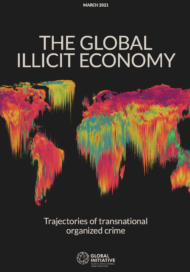Posted on 28 May 2021
The 30th annual session of the UN Commission on Crime Prevention and Criminal Justice was marred by political disputes and chicanery, but offered a glimmer of hope for expert-led discussions in the future.
The 30th session of the CCPCJ, which took place from 17 to 21 May in Vienna, was chaired by the Italian Permanent Representative. This session held special significance for Italy, as it was shortly after the first ever gathering of the CCPCJ that renowned anti-mafia judge Giovanni Falcone was assassinated in Palermo on 23 May 1992. Falcone had represented Italy at the first CCPCJ event shortly before his notorious murder, and had played a key role in arguing for and implementing improved international cooperation on criminal justice issues – a stance that was reiterated by the Italian minister for justice at this year’s event.
Another Italian to address the session was Anna Alvazzi del Frate, chair of the Alliance of NGOs on Crime Prevention and Criminal Justice. Del Frate reminded the Commission of the historical role that expert input has played at the CCPCJ. At times during the recent session, however, it was evident that the Commission was far removed from its expert roots. Instead, proceedings were stymied by political disputes that thwarted potentially fruitful thematic discussions. Nevertheless, there were some signs of hope for expert-led debates in the coming years.
The theme of this year’s session was the smuggling of migrants. Italy tabled a resolution on the issue in partnership with the US, and the conference was scheduled to hold a thematic discussion on it. But, unfortunately, the Commission was held hostage to politics and the debate was not held – a sign, if one was needed, of the way in which the commission has moved away from its ‘expert’ and substantive roots, and is becoming more politicized. A seemingly arcane dispute had emerged in the run-up to the Commission, which upended its planned agenda and forced the migrant smuggling debate to be postponed.
The dispute was around the nomination of Armenia’s Permanent Representative to act as third Vice Chair of the Commission’s Bureau (the organizing committee). Much of the first two days of the meeting consisted of a dispute between Armenia, and Turkey and Azerbaijan on this nomination. It came to a vote, which Armenia won. This is a good example of how this year’s CCPCJ session was hemmed in by politics rather than focusing on technical discussions on crime prevention and criminal justice issues. The disagreement also clearly broke the so-called ‘Vienna spirit’ of decision-making, the sacrosanct mantra of diplomacy in the UNODC circles that holds that things should be negotiated and agreed upon by consensus – not decided by voting.
If it were in isolation, this political disagreement could have been written off as insignificant. But it took place against a growing inability among the diplomatic community in Vienna to make meaningful, innovative progress in tackling illicit markets. For example, earlier in May, diplomats met at the UN to design a process for creating a new UN convention on cybercrime. As it turned out, the meeting could not agree on fundamental issues, such as where the process should be based (i.e. Vienna or New York) or how external stakeholders should be included in the process. The session consequently concluded without result. Later, on 26 May, the UN General Assembly did eventually vote through the key organizational issues, which will be analyzed in more detail in a forthcoming blog post.
In early June 2021, the international community will gather in New York for the UN General Assembly Special Session (UNGASS) on Corruption. The negotiations for the UNGASS political declaration have already been concluded in Vienna, but these, too, were fraught, with disputes between Azerbaijan and Armenia again taking centre stage. The outcome declaration reportedly does not include new agreements beyond the scope of the UN Convention Against Corruption, which was adopted in 2003. This comes after the Kyoto Declaration at the UN Crime Congress in March this year, which also came into being only after very protracted negotiations and without moving the agenda forward much. Despite this, at least the progress made in the Japanese-tabled resolution adopting the Kyoto Declaration at this year’s CCPCJ session must be recognized, and a new follow-up process has been adopted, which will entail a series of thematic discussions at the CCPCJ. This may lay the way for a new forum for expert discussion, including civil society participants, on the wide range of topics included in the Kyoto Declaration.
Negotiations on other resolutions of the CCPCJ were painfully slow, with only a small number of delegations taking an active role in the proceedings. For example, an apparently routine resolution on trafficking in persons tabled by Belarus (agreed to before the Belarus government diverted a plane to arrest an investigative journalist hostile to the regime) struggled through long sessions that were held up by disputes over terminology, the engagement of civil society, whether to tackle human trafficking in supply chains or not, and whether violence against women and girls should be a priority in this field (something Iran was keen to exclude). In the end, the resolution kept the existing UN processes going, but failed to introduce any notable new ideas.
A resolution on migrant smuggling tabled by the US and Italy incorporated a positive focus on aggravated smuggling, and on follow-the-money approaches that Falcone had promulgated three decades ago. The resolution urged concurrent tracing of financial flows and linking migrant smuggling to money laundering.
The French resolution on environmental crime pushes forward France’s consistent call for greater international cooperation and partnership, and for treating environmental crime as a serious crime and responding accordingly. However, as at the UNTOC Conference last year, France was unable to secure any major procedural step forward. Its tabled resolution envisaged a new intergovernmental expert group and the creation of a new global partnership on the issue. The agreed to resolution instead included a watered-down commitment to ‘expert discussions’ within intersessional meetings of the CCPCJ, and a call to enhance the coordination of the UNODC with other international partners. Nonetheless, France is keeping this issue high on the agenda and is making progress towards more substantive and tangible outcomes.
Overall, this session of the CCPCJ will not be remembered for those positive incremental steps that were made. The 30th anniversary of the CCPCJ would have seemed unfamiliar to Judge Falcone, who, had he been present, would have been perturbed to see international cooperation on crime impeded by politics, unable to discuss substance or draw on expertise, and largely rely on agreed to language from the past to guide the way in its normative discussions.
The main tools to tackle organized crime through the multilateral system have been forged by the policy and diplomatic community of Vienna. It is to be hoped that the upcoming deliberations, including the follow-up process to the Kyoto Crime Congress through the CCPCJ, will embrace expert-led discussion and debate, and overcome the political wrangling that has been holding it back from reaching meaningful fruition.



